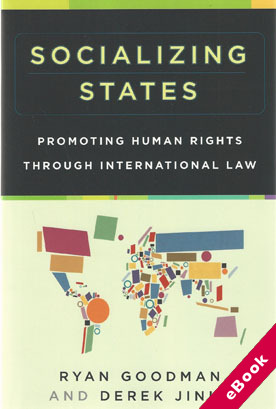
The device(s) you use to access the eBook content must be authorized with an Adobe ID before you download the product otherwise it will fail to register correctly.
For further information see https://www.wildy.com/ebook-formats
Once the order is confirmed an automated e-mail will be sent to you to allow you to download the eBook.
All eBooks are supplied firm sale and cannot be returned. If you believe there is a fault with your eBook then contact us on ebooks@wildy.com and we will help in resolving the issue. This does not affect your statutory rights.
The role of international law in global politics is as poorly understood as it is important. But how can the international legal regime encourage states to respect human rights? Given that international law lacks a centralized enforcement mechanism, it is not obvious how this law matters at all, and how it might change the behavior or preferences of state actors.
In Socializing States Ryan Goodman and Derek Jinks contend that what is needed is a greater emphasis on the mechanisms of law's social influence--and the micro-processes that drive each mechanism. Such an emphasis would make clearer the micro-foundations of international law.
This book argues for a greater specification and a more comprehensive inventory of how international law influences relevant actors to improve human rights conditions. Substantial empirical evidence suggests three conceptually distinct mechanisms whereby states and institutions might influence the behavior of other states: material inducement, persuasion, and what Goodman and Jinks call acculturation.
The latter includes social and cognitive forces such as mimicry, status maximization, prestige, and identification. The book argues that (1) acculturation is a conceptually distinct, empirically documented social process through which state behavior is influenced; and (2) acculturation-based approaches might occasion a rethinking of fundamental regime design problems in human rights law. This exercise not only allows for reexamination of policy debates in human rights law; it also provides a conceptual framework for assessing the costs and benefits of various design principles.
While acculturation is not necessarily the most important or most desirable approach to promoting human rights, a better understanding of all three mechanisms is a necessary first step in the development of an integrated theory of international law's influence. Socializing States provides the critical framework to improve our understanding of how norms operate in international society, and thereby improve the capacity of global and domestic institutions to build cultures of human rights.